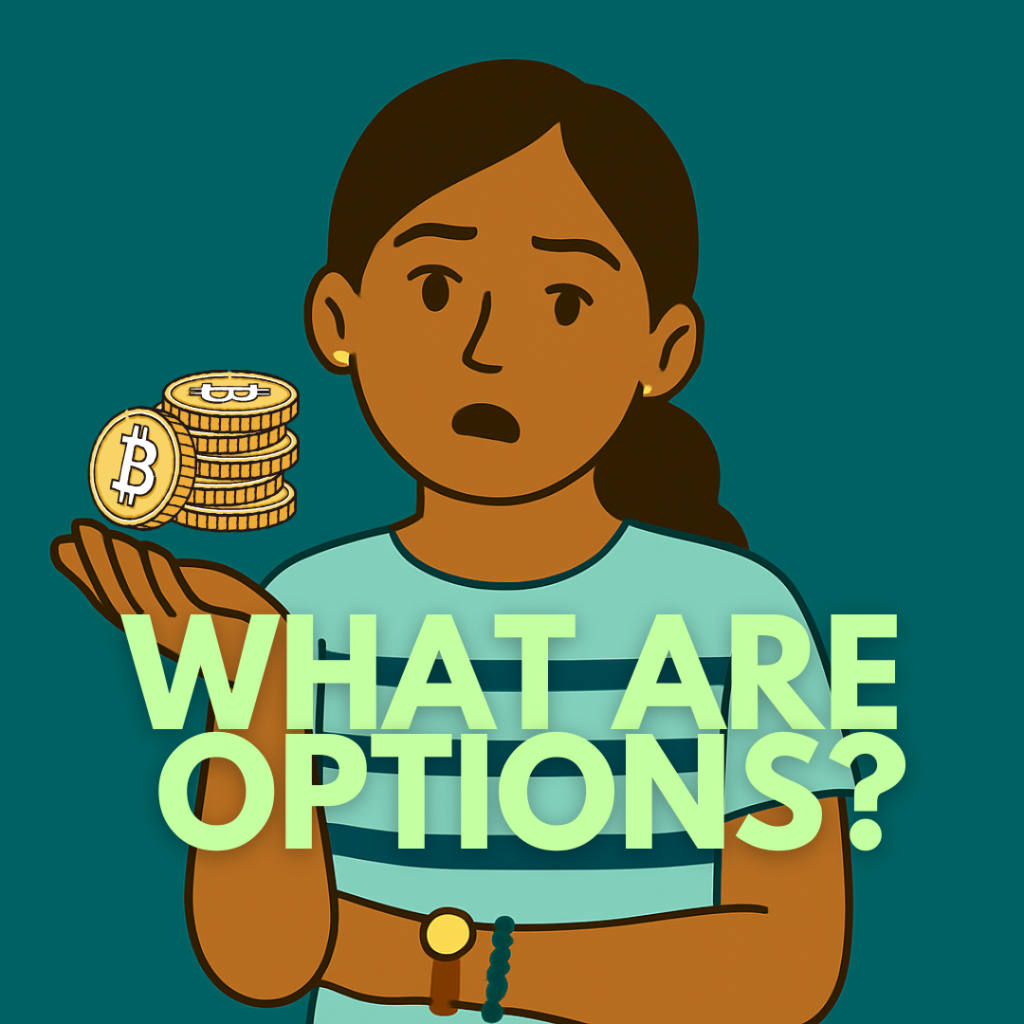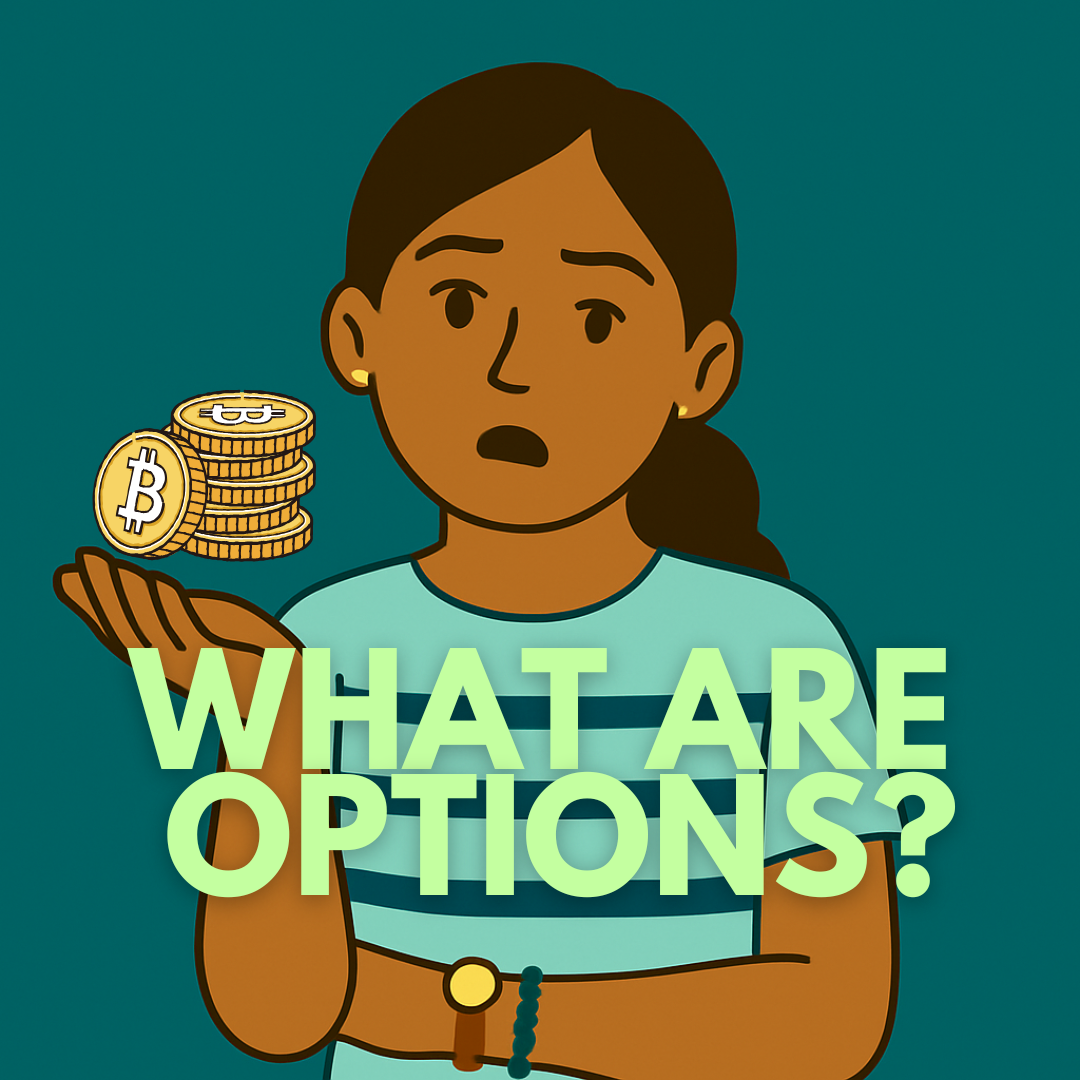The quieter cousin of perpetual futures, and the one that teaches you patience.
In Day 40, we talked about perpetual futures, the “no-expiry” contracts that let you bet on price without owning the coin. Perps are loud, fast, emotional, and sometimes overwhelming, especially when leverage enters the picture.
Today, we step into something a little calmer.
A little more strategic.
A little more… mathematical.
Welcome to options, the insurance-like side of crypto trading.
If perps are the roller coaster, options are the chessboard.

So, what exactly are options?
An option is a contract that gives you the right, but not the obligation, to buy or sell an asset at a specific price, within a specific time.
There are two types:
- Call Option – gives you the right to buy
- Put Option – gives you the right to sell
Think of it as reserving a price in advance.
You’re not committing to buy or sell, you’re just paying for the choice.
And that choice becomes valuable when the market moves.
The everyday analogy
Options feel confusing until you realize you’ve probably used the same idea in real life.
Imagine you want to buy a concert ticket, but you’re not sure if you can attend.
So you pay a small reservation fee to lock in the price.
- If you decide to watch the concert, you pay the full amount.
- If you don’t go, you lose the reservation fee, but you’re not forced to buy the ticket.
That reservation fee is what traders call the premium, the cost of buying an option.
So yes:
Options are basically the crypto version of “pa-reserve muna.”
Call option: betting on the upside
When you buy a call option, you’re paying for the right to buy the asset later at a fixed price (the strike price).
You’d do this when you believe the price will go up.
Example:
You buy a BTC call option with a strike price of $100,000.
If BTC goes to $110,000, your option becomes valuable, because you have the right to “buy at 100k” even though the market is already at 110k.
But if BTC stays below 100k?
You simply don’t exercise the option.
You just lose the small premium you paid.
It’s like saying:
“I’d rather lose a little than risk losing a lot.”
Put option: betting on the downside
A put option works the opposite way.
It gives you the right to sell an asset at a specific price.
You’d buy a put option if you think the price will go down — or if you want to protect something you already own.
For example, if you hold ETH worth $3,000, a put option can act like insurance.
If the market crashes to $2,000, your put gives you the right to “sell at 3k” — saving you from a painful loss.
This is why options are often described as insurance.
They help traders hedge, protect, and manage risk without liquidating everything.
How options differ from perps
What I love about explaining options after perps is how clearly the differences appear:
| Perps (Day 40) | Options (Today) |
|---|---|
| No expiry | Has an expiry date |
| Liquidation risk | No liquidation when buying options |
| Continuous funding rates | No funding fees |
| Highly emotional | More strategic |
| Easy to enter, easy to overtrade | Requires planning |
With perps, the market pushes you around.
With options, you make your move quietly, then wait.
It’s patience disguised as a trade.
Why options matter even if you never trade them
Not everyone needs to trade options, just like not everyone needs to short markets or use leverage.
But understanding options helps you understand:
- How traders hedge
- How whales manage risk
- Why markets sometimes move in strange ways
- Why some people profit even when the market is flat
- How volatility affects pricing
Because options are based on probability, timing, and volatility, they reveal something perps don’t:
👉 The market isn’t just about price.
It’s also about expectations.
Options show you what the market thinks might happen, not just what the market is doing.
When beginners should consider options
If you’re new to crypto trading, here’s the honest truth:
You don’t start with options.
You work your way toward them.
But these situations are where options shine:
- You want to protect profits
- You want to buy future dips without overexposing
- You want to earn premiums (through selling options, a more advanced move)
- You want exposure without leverage or liquidation risk
Options let you participate safely, without taking oversized bets.
They are the “I want exposure, but not stress” tool.
Takeaway
Options are one of the most misunderstood parts of crypto, but one of the most empowering once you get the hang of them.
They protect you when markets get crazy.
They let you participate without drowning in leverage.
And they help you plan instead of panic.
If perps teach you how markets move fast,
options teach you how to breathe.
Have you ever seen the words call and put and felt confused?
Tell me which part still feels fuzzy, I’ll explain it again in the simplest way possible.

Leave a Reply